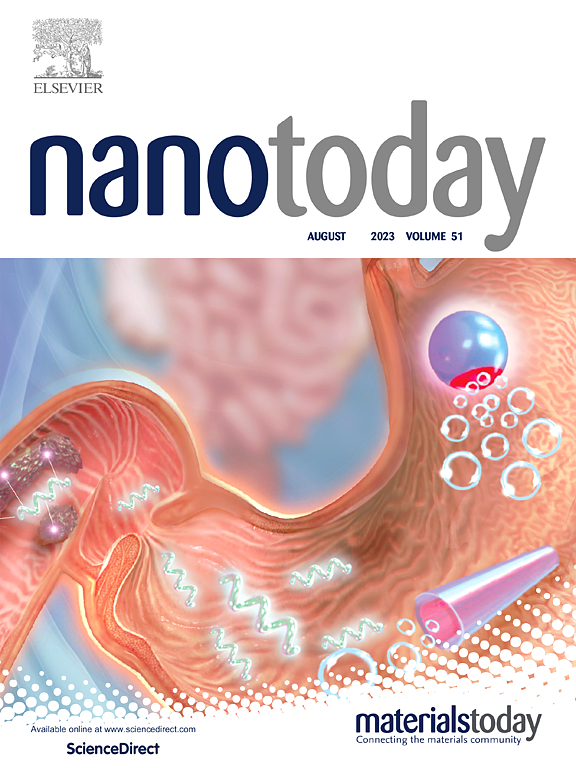Cruciferae-based oral selenium delivery system reprograms antitumor response and enhances the anti-tumor potency of natural killer cells
IF 13.2
1区 材料科学
Q1 CHEMISTRY, MULTIDISCIPLINARY
引用次数: 0
Abstract
Natural killer (NK) cell-based immunotherapy represents a promising approach for lung cancer treatment, but its clinical efficacy is limited by poor in vivo persistence and cytotoxicity. Selenium, an essential trace element with immunomodulatory and antitumor properties, offers therapeutic potential, but its application is constrained by low bioavailability. In this study, Chinese Kale (Brassica oleracea var. alboglabra, BOA) was used to construct an oral kale seedlings biotransformation nano-selenium delivery system (Se@BOA). By inducing mitochondrial apoptosis in tumor cells, Se@BOA could effectively reprogram non-small-cell lung cancer immune resistance and enhance the killing abilities of NK cells on A549 cells in vitro, and additionally promote the activation of innate immune cells as well as adoptive NK cells to lyse tumors in vivo. Further mechanistic studies demonstrated that Se@BOA sensitizes tumor cells to NK cells by triggering DNA damage and p53 signaling pathways to induce NKG2DLs and death receptor expression. Additionally, Se@BOA could activate the AHR-STAT3 signaling cascade and promote NKG2D and NKp44 receptor expression on NK cells and thus inhibit tumor immune escape. Taken together, these findings reveal a novel strategy to improve selenium bioavailability and enhance the antitumor efficacy of allogenic human NK cell infusions, potentially informing the development of a plant-derived oral selenium delivery system to support NK cell therapy against lung cancer.
以十字花科植物为基础的口服硒给药系统可重新编程抗肿瘤反应,增强自然杀伤细胞的抗肿瘤效力
基于自然杀伤(NK)细胞的免疫疗法是一种很有前途的肺癌治疗方法,但其临床疗效受到体内持久性和细胞毒性差的限制。硒是一种具有免疫调节和抗肿瘤特性的必需微量元素,具有治疗潜力,但其应用受到生物利用度低的限制。本研究以芥蓝(Brassica oleracea var. alboglabra, BOA)为材料,构建了甘蓝幼苗口服生物转化纳米硒传递体系(Se@BOA)。Se@BOA通过诱导肿瘤细胞线粒体凋亡,在体外可有效重编程非小细胞肺癌免疫抵抗,增强NK细胞对A549细胞的杀伤能力,并在体内促进先天免疫细胞的活化和过继NK细胞裂解肿瘤。进一步的机制研究表明,Se@BOA通过触发DNA损伤和p53信号通路诱导nkg2dl和死亡受体表达,使肿瘤细胞对NK细胞敏感。Se@BOA可以激活AHR-STAT3信号级联,促进NKG2D和NKp44受体在NK细胞上的表达,从而抑制肿瘤免疫逃逸。综上所述,这些发现揭示了一种提高硒生物利用度和增强同种异体人NK细胞输注抗肿瘤功效的新策略,可能为开发一种植物源性口服硒递送系统提供信息,以支持NK细胞治疗肺癌。
本文章由计算机程序翻译,如有差异,请以英文原文为准。
求助全文
约1分钟内获得全文
求助全文
来源期刊

Nano Today
工程技术-材料科学:综合
CiteScore
21.50
自引率
3.40%
发文量
305
审稿时长
40 days
期刊介绍:
Nano Today is a journal dedicated to publishing influential and innovative work in the field of nanoscience and technology. It covers a wide range of subject areas including biomaterials, materials chemistry, materials science, chemistry, bioengineering, biochemistry, genetics and molecular biology, engineering, and nanotechnology. The journal considers articles that inform readers about the latest research, breakthroughs, and topical issues in these fields. It provides comprehensive coverage through a mixture of peer-reviewed articles, research news, and information on key developments. Nano Today is abstracted and indexed in Science Citation Index, Ei Compendex, Embase, Scopus, and INSPEC.
 求助内容:
求助内容: 应助结果提醒方式:
应助结果提醒方式:


